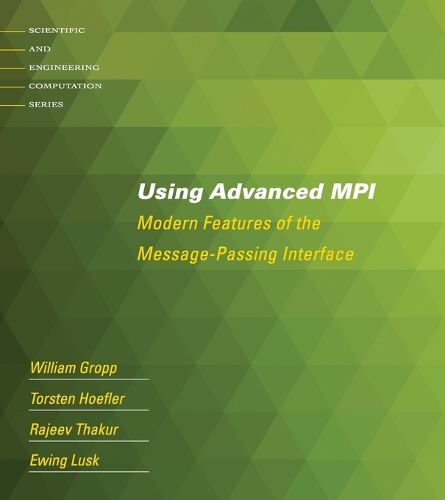Readings Newsletter
Become a Readings Member to make your shopping experience even easier.
Sign in or sign up for free!
You’re not far away from qualifying for FREE standard shipping within Australia
You’ve qualified for FREE standard shipping within Australia
The cart is loading…






A guide to advanced features of MPI, reflecting the latest version of the MPI standard, that takes an example-driven, tutorial approach.
This book offers a practical guide to the advanced features of the MPI (Message-Passing Interface) standard library for writing programs for parallel computers. It covers new features added in MPI-3, the latest version of the MPI standard, and updates from MPI-2. Like its companion volume, Using MPI, the book takes an informal, example-driven, tutorial approach. The material in each chapter is organized according to the complexity of the programs used as examples, starting with the simplest example and moving to more complex ones.
Using Advanced MPI covers major changes in MPI-3, including changes to remote memory access and one-sided communication that simplify semantics and enable better performance on modern hardware; new features such as nonblocking and neighborhood collectives for greater scalability on large systems; and minor updates to parallel I/O and dynamic processes. It also covers support for hybrid shared-memory/message-passing programming; MPI_Message, which aids in certain types of multithreaded programming; features that handle very large data; an interface that allows the programmer and the developer to access performance data; and a new binding of MPI to Fortran.
$9.00 standard shipping within Australia
FREE standard shipping within Australia for orders over $100.00
Express & International shipping calculated at checkout
Stock availability can be subject to change without notice. We recommend calling the shop or contacting our online team to check availability of low stock items. Please see our Shopping Online page for more details.
A guide to advanced features of MPI, reflecting the latest version of the MPI standard, that takes an example-driven, tutorial approach.
This book offers a practical guide to the advanced features of the MPI (Message-Passing Interface) standard library for writing programs for parallel computers. It covers new features added in MPI-3, the latest version of the MPI standard, and updates from MPI-2. Like its companion volume, Using MPI, the book takes an informal, example-driven, tutorial approach. The material in each chapter is organized according to the complexity of the programs used as examples, starting with the simplest example and moving to more complex ones.
Using Advanced MPI covers major changes in MPI-3, including changes to remote memory access and one-sided communication that simplify semantics and enable better performance on modern hardware; new features such as nonblocking and neighborhood collectives for greater scalability on large systems; and minor updates to parallel I/O and dynamic processes. It also covers support for hybrid shared-memory/message-passing programming; MPI_Message, which aids in certain types of multithreaded programming; features that handle very large data; an interface that allows the programmer and the developer to access performance data; and a new binding of MPI to Fortran.